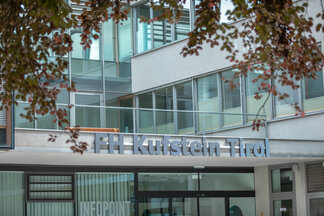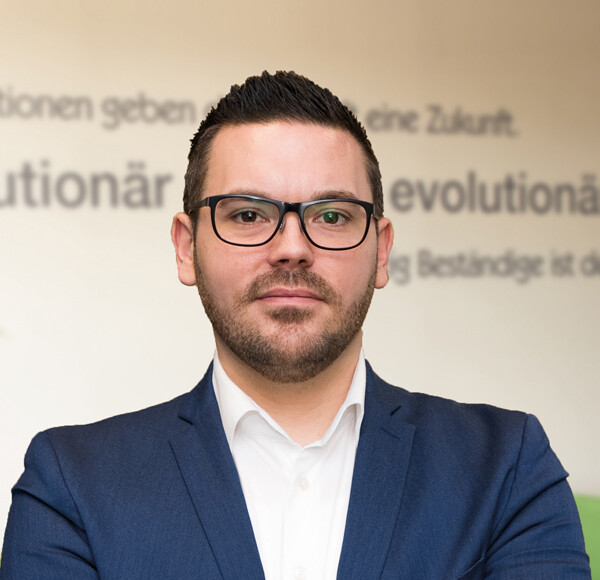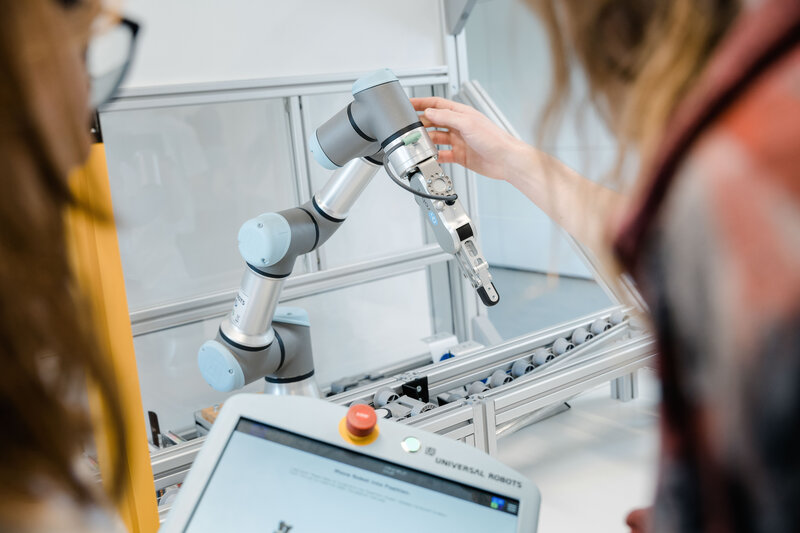Our part-time Master addresses key business questions: How can we optimize and digitalize processes and create value for our customers? Build your future with excellent career opportunities and the flexibility to choose electives that match your interests.

ERP Systems & Business Process Management
Master's degree program
Overview
-
Qualification Level:
Stufe 2, Master -
Price:
Euro 363,36* (excl. Student Union-fees) each semester -
Academic Degree:
Master of Arts in Business (MA) -
Academic Program:
Part-time -
Language:
75% German, 25% English -
Remote Options:
E-Learning min. 20 % online -
Exchange Semester:
Supervised week abroad, 2nd semester** -
Admission Requirements:
General admission requirements -
Study Places per Year:
23
Program Description



Explore our ERP Systems & Business Process Management program! It integrates business processes with applied IT and digitalization, offering a hands-on learning experience with expert faculty, labs, and projects. Discover how ERP systems drive digital transformation, benefit from networking opportunities at industry conferences, and earn additional professional certifications.
Our Master's degree program in ERP Systems & Business Process Management provides a thorough understanding of process and quality management. Students learn to document, model, and measure processes, and are introduced to various improvement methods like re-engineering, lean management, and Six Sigma. The program emphasizes standards, process reference models, and maturity models for guiding process enhancements. A key focus is the digitalization of processes using ERP systems such as SAP, including system selection, adaptation, and implementation. Additionally, students explore methods like process mining and the use of CRM, SCM, software robots, and workflow management systems to effectively support and optimize operational processes.
Study Focus
-
21 %
Management & business process expertise
-
33 %
Expertise in IT systems & data management
-
09 %
Subject-specific specializations & electives
-
12 %
Social & International Skills
-
25 %
Practice knowledge transfer & Master's thesis
What You Will Learn
-
Understanding operational processes
-
Recording, documenting, analyzing and improving processes
-
Eliciting and prioritizing requirements for IT systems
-
Knowing digitization options
-
Understanding ERP systems from different manufacturers
-
Being able to select ERP systems
-
Making modifications to ERP systems
-
Analyzing and preparing ERP data
Popular Occupational Fields
- Senior Consultant (IT, ERP, Process Management)
- Project manager (in particular for process improvements, ERP implementations, migrations)
- End-to-end process integration managers and process coaches
- Quality managers
- Information managers
- ERP module managers
Career Opportunities
-
100+ vacancies
for process engineers in Austria (according to Stepstone)
-
600+ vacancies
in the field of ERP in Austria (according to Stepstone)
-
EUR 52,000 average starting salary
for IT consultants
-
> EUR 58,000 gross annual salary
ERP / SAP consultants
-
+3.4 % growth
in the ERP market (according to Statista)
The path to the Master's degree

The degree program is structured into four key areas: Operational Processes, Analysis and Optimization, Digitalization through ERP Systems, and Project/Change Management. Practical projects and interdisciplinary teaching methods foster professional skills and intercultural competencies, preparing students to tackle a variety of challenges across diverse work environments.
Special features:
-
Exchange of experience with companies
-
Professional certificates optional
-
Optional modules for customized design
Recognition of Prior Learning
Students have the option to receive credit for skills and competencies they have already acquired before the start of each semester.
To apply for credit, they must submit a request directly to the Director of Studies.
Director of Studies

Prof. (FH) DI Dr. Martin Adam
Director of Studies Bachelor Drone Engineering & AI-based Innovation, Industrial Engineering & Management, Master ERP-Systems & Business Process Management, Master Smart Products & Solutions, Smart Products & AI-driven Development
Curriculum
Company Processes
Supplier Management & Customer Relationship Management
- Semester 1
- 4 ECTS
Procurement * Supply Management * Procurement Process * Types of Goods * ABC Analysis * Procurement Strategy * Key Figures Basic Concepts of E-Procurement * Basics of E-Business * Partial Concepts of E-Procurement
DetailsProcess Monitoring & Business Reporting
- Semester 1
- 3 ECTS
* Strategic planning * Operational key figures * Key figure systems * Types of operational key figures * Display of performance key figures * Reporting options in ERP systems
DetailsData protection & Law
- Semester 3
- 3 ECTS
Part contract law, labor law: * Contents of contract law * Basic principles of labor law * Basic principles of commercial law * Basic principles of company law * Basic principles of e-commerce * Copyright law, in particular in the field of software part data protection, IT law: * Introduction to the concept of data protection and its implementation * Definitions * Basic data protection regulation, in particular with regard to specially protected data * Rights of data subjects * Organizational measures for the protection of personal data * Criminal/civil law aspects * Legal particularities of commissioned data processing and cross-border data traffic
DetailsData Management
Data Engineering for ERP Systems (E)
- Semester 2
- 5 ECTS
* Distributed databases * distributed database management system (DDBMS) * transaction management in DDBMS * synchronization and recovery in DDBMS * database management in ERP-systems.
DetailsBusiness Intelligence & Analytics(E)
- Semester 3
- 6 ECTS
* Concept of business intelligence and specific aspects such as datawarehouse, OLAP. * Methods and techniques of data mining and process mining * Techniques and up-to-date tools in the field of data warehousing & data mining * Case studies or projects in the subject area with practical application of tools * Tools in the field of business intelligence
DetailsData Visualization & Visual Analytics (elective)*
- Semester 3
- 4 ECTS
The following content is discussed in the course: - Evaluation tools with visual orientation, e.g. Bl tools such as MS PowerBl, Tableau, QlikView - Display libraries, e.g. matplotlib.pyplot, gglot2 - Rules of visual communication, e.g. Hichert SUCCESSSS
DetailsEngineering
Quantitative Process & quality management (Six Sigma) (elective)*
- Semester 3
- 4 ECTS
* Basics of Descriptive Statistics * Measurement System Analysis * Sampling * Statistical Process Control * Process Control Charts * Process Capability Analysis * Components of Variants Analysis (COV) * Repetition Basics of Concluding Statistics * Failure Cause Determination via Hypothesis Testing (T-test, Chi-Sq, ANOVA) * Multiple Regression Analysis
DetailsAgile Product Development (elective)*
- Semester 3
- 4 ECTS
* Overview of agile process methods * Roles in the agile process * Running an agile project (sprins, dailies, demos, retros) * Coaching an agile project (e.g. question techniques) * Experience with agile projects from software development * The challenge of developing smart products * Methods of product development (e.g. FMEA, TRIZ) * Advantages of hybrid process methods * Role of management in the agile process
DetailsHuman-Computer Interaction (elective)*
- Semester 3
- 4 ECTS
The lecture teaches basic concepts from the field of human-computer interaction (usability, user experience, user inter-face design) and information visualization. This includes the following focal points: User interface architectures; design criteria, guidelines and standards for the creation and modelling of user interfaces of interactive systems; approaches and methods (quantitative and qualitative) for the evaluation of user interfaces of interactive systems; web style guides and evaluation criteria for websites (e.g. with regard to accessibility); basics of information presentation and data visualization; interactive information visualization; the theoretical lecture contents are prepared in the exercise using practical examples and implemented in a small project (usability evaluation) in a team.
DetailsTrends in Web Technologies (elective)
- Semester 4
- 3 ECTS
The contents of this course are not set, but will be adapted to the current prevailing trends. Content examples may include: - New technologies in the field of web architectures - Trends in the field of programming languages on the web - New design concepts in the field of web applications - New questions in the field of research in web technologies and applications - New questions in the field of web development practice
DetailsTrends in Data Science (elective)*
- Semester 4
- 3 ECTS
The contents of this course are not set, but will be adapted to the current prevailing trends. Content examples may include: - New technologies in the field of Big Data Processing - Trends in programming languages in data analysis - New concepts of data processing (e.g. Data Lake) - New questions in the field of data science research - New questions in data science practice
DetailsTrends in ERP (WP)*
- Semester 4
- 3 ECTS
Current developments in the area of business application systems with special emphasis on ERP-systems. Models, examples, best practice cases
DetailsTrends in Smart Products(elective)*
- Semester 4
- 3 ECTS
* Current best practice approaches and concepts in application areas (e.g. Smart Home, Smart City, Smart Production, Connected Vehicles, etc.) * Current best practice approaches with regard to development processes and tools * Current research and development activities or research and development results
DetailsIT Systems
Requirements Engineering
- Semester 1
- 3 ECTS
* Benefits of requirements engineering * Basic terms of requirements engineering * Types of requirements * Requirements engineering and system development * Requirements engineering process * System analysis in requirements engineering * Business processes and requirements * Techniques for determining requirements * Natural language documentation of requirements * Model-based documentation of requirements * Deriving test cases from requirements * Evaluating requirements * Quality criteria for requirements * Checking requirements * Managing requirements * Tool support
DetailsIT infrastructure
- Semester 1
- 3 ECTS
-Components of IT infrastructure (function, development, * Function of computer systems * Development * Networks, Internet operating systems -development of hardware platforms * Microsystems, system on a chip * Cloud systems * Virtualization
DetailsERP Systems 1: Administration & Disposition Systems
- Semester 1
- 6 ECTS
* Operational requirements in information management operational and planning tasks * Overview of the structure and functional scope of typical ERP systems (company codes, business areas, processes) * Integration of the individual modules of an ERP system * Overview of ERP system SAP ERP, SAP S4/ Hana, etc. * Specialization in the SAP modules SD, MM, PP.
DetailsWorkflow Management
- Semester 2
- 4 ECTS
* Basic terms: Business process, workflow, BPMS, WFMS, RPA, etc. * Classification of WFMS/RPA; differentiation of ERP systems * Historical development (from WFMS to BPMS to RPA) * Architecture of WFMS/RPA systems * Overview of process spectrum (from repetitive and predictable, to non-repetitive and unpredictable) * From functional process models to executable process models * Organizational and technical implementation
DetailsERP Systems 2: Planning and Control Systems
- Semester 2
- 3 ECTS
* Modules for presenting information to decision makers * Preparation of information for corporate planning and monitoring * Introduction to SAP modules FI and CO
DetailsIT Management
- Semester 2
- 3 ECTS
* IT Governance and IT Strategy * Demand Management * IT Monitoring * IT Sourcing * IT Security and Risk Management * IT Compliance
DetailsERP Systems 3: Selection and Implementation
- Semester 3
- 4 ECTS
* ERP life cycle * Overview of ERP systems * Criteria for selecting ERP systems * Procedures for implementing ERP systems * Procedure for testing ERP systems * Licensing models * Overview of third-party product range (in addition to SAP) * Basic functionality of the third-party vendor * Selected transactions in the third-party vendor's software * Advantages/disadvantages between SAP and the third-party vendor
DetailsInternet of Things (elective)*
- Semester 3
- 4 ECTS
Introduction * IoT architecture (e.g. reference models) * Requirements for IOT systems * IOT data transmission protocols * Use of IOT in an industrial context (examples) * Basics of sensor technology * Basics of embedded systems Implementation * Procedure for implementing IOT * Prototypical implementation of IOT * Selection of sensors * Collection, visualization and evaluation of data * Implementation challenges
DetailsApplication-oriented analysis platforms (elective)*
- Semester 3
- 4 ECTS
The following content is discussed in the course: - Presentation of different user-oriented analysis platforms (e.g. KNIME, RapidMiner, Grafana) - Presentation of different cloud solutions for data analysis (e.g. Google Cloud, AWS, Azure) - Application of the platforms presented using the example of analysis data sets - Discussion of the different approaches
DetailsBusiness Platforms & Cloud Computing (elective)*
- Semester 3
- 4 ECTS
Students are given an overview of common business platforms and cloud computing. In addition, the advantages and disadvantages of the respective platforms are discussed. Students are therefore able to select suitable platforms for a given problem. Students gain practical experience with selected platforms using case studies. In addition, methods for defining interfaces are discussed with the students.
DetailsProcess Automation (elective)*
- Semester 3
- 4 ECTS
* Basic terms: Business process, workflow, BPMS, WFMS, RPA, etc. * Selection criteria for workflow engines for process automation * Architecture and integration of workflows for process automation * Overview of interprocess communication * Transactional properties of processes, simulation and code generation * Basics of Microsoft Dynamics 365: Modules and navigation, basic entities and standard workflows * Organizational and technical implementation with configuration and declarative programming
DetailsERP-Systeme 4: Customizing, Modification
- Semester 4
- 3 ECTS
Approach to customizing and modification of ERP systems, getting familiar with software for development (infrastructure), testing of software components of a corporate information system, practical examples
Detailspractical transfer
Study trip (E)
- Semester 2
- 3 ECTS
* Cultural/country-specific characteristics of corporate organizations * Cultural influences on process improvement projects * Country-specific differences in the selection and implementation of ERP systems
DetailsPractical Project
- Semester 3
- 4 ECTS
The graduate, the student: * Can lead IT and process improvement projects * Can structure projects/project teams (results, times, resources) * Knows the tasks and responsibilities as a project team member
DetailsAcademic Methods
- Semester 3
- 2 ECTS
The graduate, the student: * Knows scientific methods * Can formulate research questions and create a disposition to a subject * Can work on a subject with scientific methods * Can research literature independently
DetailsMaster Thesis
- Semester 4
- 22 ECTS
Independently study and work out a specialist topic from the field of economics and information technology using scientific methods.
DetailsColloquium for the Master thesis
- Semester 4
- 2 ECTS
* Accompanying the students during the preparation of the Master thesis. * In the colloquium, the question/hypothesis and structure of the Master thesis are presented and discussed. * In addition, the scientific methodology of the Master thesis is discussed and questioned and advice is given on the formal design of the Master thesis.
DetailsProcess/Quality Management
Lean Quality Management (E)
- Semester 1
- 5 ECTS
* The terms quality, quality assurance and quality management * Types and dimensions of quality * Conflict and the magic triangle of value-added systems * Reasons for quality management systems and their benefits * Historical development of quality management * Quality costs * Overview of methods, techniques, tools for implementing and anchoring QM
DetailsBusiness Process Modelling & Optimization
- Semester 1
- 6 ECTS
* Identifying customer and business requirements * Modeling processes * Applying process modeling tools * Measuring process performance * Analyzing processes * Improving process performance
DetailsBusiness Process Management
- Semester 2
- 4 ECTS
* Leveraging Process Management * Process Management Framework * Selecting Processes for Strategic Improvement * Visualizing Process Performance * Performing Process Audits * Establishing Process Governance * Process Interface Management * Implementing Process Management
Detailssocial skills
Change Management
- Semester 2
- 2 ECTS
* Importance of change management * Individual and social aspects of change * Resistance, conflict and crisis * Basic approaches to change management * Types of change * Models of change (e.g. Lewin, GE-CAP, etc.) * (Project) management of change: Generic phase model and integration in projects * Techniques and tools of change (e.g. target circle, change stretch, WIIFM, Empathy Map, etc.)
DetailsProject Management (E)
- Semester 2
- 4 ECTS
Project Management Basics with focus on process improvement and ERP implementation * Setting up a project (goals, scope, timeline, etc.) * Planning project results, tasks, time and resources * Installing a project team and communicating with stakeholders * Managing results, risks, quality, time and budget Agile Project Management Methods: * Challenges in traditional project management * Scrum framework and agile approach and principles * Agile artifacts (Scrum, sprints, backlogs, dailies, retro, etc.) * Release management in agile projects * Hybrid project management methods
DetailsModeration and Presentation Techniques
- Semester 2
- 2 ECTS
* Moderation writing exercises, flipchart design, pin board layout, pictogram design, standard visualizations * Feedback on stance, voice, speaking, type of presentation and intervention in disruptions * Interdisciplinary presentation and moderation techniques, dialog presentations * All presentations and moderations as exercises in small groups; each participant presents and moderates as an experi-ence in their own right
DetailsConflict Management & Negotiation Techniques
- Semester 3
- 3 ECTS
Conflict management: * Causes of conflicts * Methods for dealing with conflicts Negotiation techniques: * Solution-focused communication * Non-violent communication * Discussion of classic negotiation models
DetailsStudy regulations to download
-
ERP-System & Business Process Management
in effect since October 07, 2020, start of study program from academic year 2021/22
- All study regulations
Frequently Asked Questions
Do I have to work while studying?
No, there is no obligation to work or to be active in the industry. The course offers you the opportunity for further development, even if you are working in another profession or are not currently working.
Unlike a dual study program, there is no binding contract with a company. Many students also use the course during parental leave or for professional reorientation.
Does the course take place every Friday and Saturday in Kufstein?
The program has an attendance component of at least 50 %. As a rule, online-only weekends alternate with attendance weekends.
What about the advanced professional certificates?
The additional professional certificates offered are further proof of qualification in the core subjects of the degree program, which can be obtained with little additional effort (most of the content is taught in the courses) and reduced certification costs in addition to the degree.
Should you reduce your job to study?
As the course is offered on Friday afternoons and Saturdays, it is generally possible to work full-time. However, due to the amount of study required for the examinations, we recommend a reduction to approx. 80%.
How much prior IT knowledge is required?
The course is not a computer science course. The content is the selection and introduction of standard IT systems in companies. Simple low- to no-code applications are used for the evaluation of data or the adaptation of standard IT systems.












